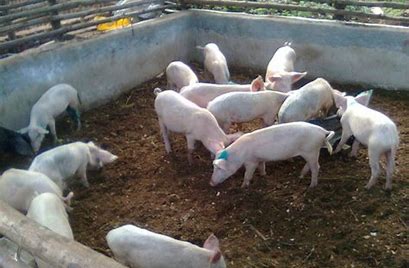

Hygiene is a whole range of non-medicinal measures with the goal to improve the health status of the animals and to prevent diseases in order to optimise the production results. There are both external and internal safety measures.
External measures to prevent entering of pathogens
Location of the farm: should be far enough from other farms, esp. in the direction of the dominant wind. Some infectious particles can spread through the air or by flies over short distances. Also rodents can spread some diseases from one farm to another.(This is called constitutional biosecurity).
Purchasing policy: on the breeding farm, purchasing should be minimised and carefully selected on sanitary status and vaccination.
Quarantine: when new animals are brought on the farm, they should be kept in separate for observation. Practically, this period is 4 to 6 weeks. When a fattening farm is ran on a strict “all in all out” base, the whole cycle can be seen as a quarantine.
Visitors: should be minimised. Before entering the farm, they should put on an overall and boots that remain on the farm. They should also wash and disinfect their hands
Vehicles: trucks transporting animals should be thoroughly cleaned and disinfected between every transport to prevent cross-contamination. The rule is : first clean, then disinfect. For cleaning, a slightly alkaline detergent should be used (alkaline products remove organic dirt like fats and certain proteins; acids remove inorganic dirt like lime scale).
Footbaths: at the entrance of every house, a footbath should be installed. First, the boots should be cleaned and only then dipped in the foot dip. The disinfectant should have a broad spectrum to kill ALL micro-organisms, even in presence of organic material, and should keep it’s activities at low temperatures (check if it has been tested at 4° C or 40 ° F ) and at all pH values (which is not the case with chlorine, for example) . Ideally, it should be renewed daily.
Internal measures to prevent development and transmission of pathogens within the farm
Cleaning and disinfection: after every cycle, cleaning, disinfection and sanitary stops are essential. A long sanitary stop or “downtime” will never kill the eggs of Ascaris, Isospora nor Eimeria (coccidiosis), nor will it eliminate Rota virusses nor bacteria that cause Dysenteria. So, disinfection is a must
Hygiene consists of two parts. Cleaning and disinfecting. Disinfection without cleaning first is a waste of money. Cleaning is the management of dirt that can be seen partially: to separate and remove this dirt from a surface, through water and a detergent. In other words : to make the surface as free as possible from organic soil, that would impede the disinfectant to reach the surface.
 Contact Jaguza Support
Contact Jaguza Support